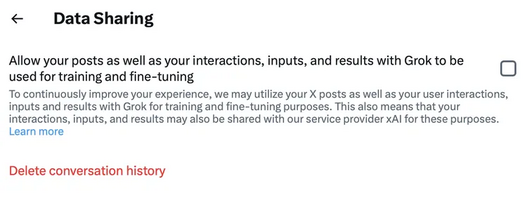Please note that all submissions to the site are subject to the wiki's licence, CC 4.0 BY-SA, as found here
X Corp.
| Basic information | |
|---|---|
| Founded | 2006, renamed in 2023 |
| Type | Private |
| Industry | Social Media |
| Official website | https://x.com |

X, formerly known as Twitter, is a global social-media platform that facilitates real-time communication and the sharing of short messages, known as "tweets". Founded in 2006 by Jack Dorsey, Noah Glass, Biz Stone, and Evan Williams, Twitter quickly became a key platform for public discourse, news, and social interaction. Known for its character-limited posts and use of hashtags (#), Twitter played a pivotal role in shaping online communication, politics, and social movements.
In 2023, Twitter underwent a significant rebranding, adopting the name X, after being acquired by Elon Musk in a high-profile deal in the previous year. Elon Musk took the company private and underwent a large sweep of leadership changes including layoffs and policy shifts. X has faced scrutiny over various issues, including content-moderation practices, the de-prioritization of accessibility features, data-privacy concerns, and its handling of user-generated content.
Consumer-protection profile[edit | edit source]
Privacy[edit | edit source]
- X can read private messages sent through the platform.
- X uses personal data collected from its website for third-part advertisements.
- Personal data collected include:
- Location data,
- What web page refers you to X,
- Content posted (tweets),
- Replies, and
- Interactions such as likes and follows.
Transparency[edit | edit source]
Since the X's acquisition in 2022, X has faced a number of transparency concerns:
- In alignment with the downsizing of X, the communications department was unofficially disbanded.
- X has come under scrutiny for its unclear content-moderation policies including what content is prohibited on the service. This stems partially from the inconsistent enforcement of platform rules.
- With the introduction of Twitter Blue, users were able to obtain a badge resembling one of an account verified to belong to a person or organization of importance. This incident blurred the lines between organic content and paid promotions.
- As of February 2, 2023, X has discontinued free access to its Application Programming Interface (API). This was replaced with paid plans.
Freedom[edit | edit source]
- X has the ability to delete content without prior notice and without a formal reason.
- X has a binding forced arbitration clause in its terms of service. This includes prevention against class-action lawsuits.
Consumer-protection incidents[edit | edit source]
Terms of service allows use of user content to training AI (Nov. 2024)[edit | edit source]

On November 15, 2024, X issued new Terms of Service (TOS) to allow artificial intelligence (AI) to train on user content:[1][2]
"By submitting, posting or displaying Content on or through the Services, you grant us a worldwide, non-exclusive, royalty-free license (with the right to sublicense) to use, copy, reproduce, process, adapt, modify, publish, transmit, display, upload, download, and distribute such Content in any and all media or distribution methods now known or later developed, for any purpose. For clarity, these rights include, for example, curating, transforming, and translating. This license authorizes us to make your Content available to the rest of the world and to let others do the same. You agree that this license includes the right for us to (i) analyze text and other information you provide and to otherwise provide, promote, and improve the Services, including, for example, for use with and training of our machine learning and artificial intelligence models, whether generative or another type…"
This development raises concerns over the user's right to his own intellectual data posted on X. There is also concern over the privacy implications of private conversations being used to train a public AI. This AI may use work by content creators, artists, and writers without compensation. Being buried in a large TOS, this is a clear example of taking away the consumer's right of ownership and not obtaining adequate disclosure.
As a response to the increased backlash, X has released a feature to opt out of sharing data by navigating 4 different menus (Settings⇒Privacy and Safety⇒Data Sharing and Personalization⇒Grok⇒Allow your posts as well as your interactions, inputs, and results with Grok to be used for training and fine-tuning).[3] This setting being on by default is an example of a dark pattern.
Data hack affecting millions of users (Jan. 2023)[edit | edit source]
In January 2023, X underwent a data breach, causing millions of account emails to be leaked.[4] X, under the new ownership of Elon Musk, did not take the precautionary steps to prevent this incident. Before the data hack, X underwent significant layoffs, including ones which affected the trust, safety, and security teams. This is directly linked to the weakening of security before the breach, as these teams were essential for identifying vulnerabilities and patching them. Moreover, the media communications team was disbanded, leading to a lack of transparency surrounding the issue.
Reduction in accessibility features (Nov. 2022)[edit | edit source]
Throughout the later half of 2022, Twitter laid off much of its staff. Among these layoffs was the accessibility team, created in 2020 to improve the use of Twitter for disabled consumers. Of the many features introduced by the team, "alt-text" was added to allow visually impaired users to hear a description of an image.[5]
As a result of the de-prioritization of accessibility in Twitter, alt-text badges were removed, making it more challenging for visually impaired users to identity accessible content.[5]
Twitter illegally uses collected data (May. 2022)[edit | edit source]
In May 2022, the Federal Trade Commission (FTC) fined Twitter $150 million dollars for using data collected for targeted advertisements. In 2011, Twitter made an agreement with regulators in which it vowed not to share information gathered for security purposes with third-parties for targeted advertisements.[6]
Information that was illegally used for targeted advertisements includes phone numbers and email addresses. The user agreed that this information will be used for services such as two-factor authentication (2FA), account recovery, and account safeguarding.[7]
References[edit | edit source]
- ↑ https://edition.cnn.com/2024/10/21/tech/x-twitter-terms-of-service/index.html
- ↑ https://x.com/en/tos#current
- ↑ https://www.theverge.com/2024/7/26/24206904/x-grok-ai-train-turn-off
- ↑ https://www.bbc.com/news/technology-64153381
- ↑ 5.0 5.1 https://www.wired.com/story/twitter-layoffs-accessibility/
- ↑ https://www.npr.org/2022/05/25/1101275323/twitter-privacy-settlement-doj-ftc
- ↑ https://www.ftc.gov/business-guidance/blog/2022/05/twitter-pay-150-million-penalty-allegedly-breaking-its-privacy-promises-again
